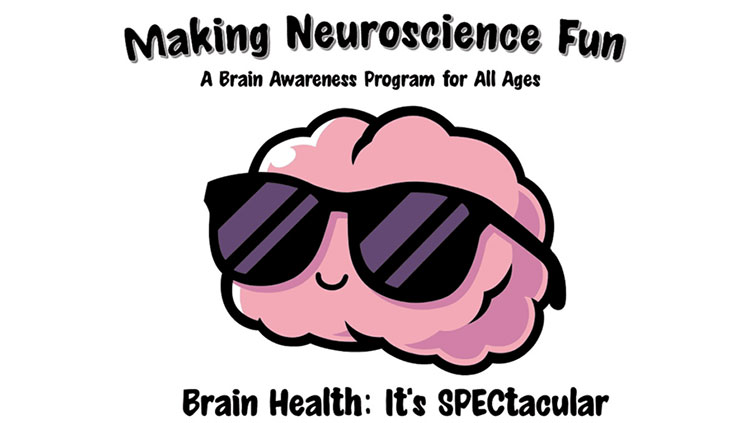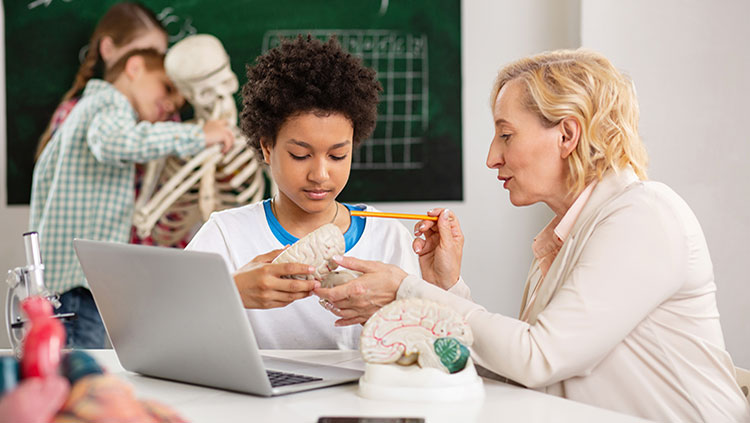Brain Health: It’s SPECtacular (Ep. 4) — How Physical Activity, Sleep, and Nutrition Impact Brain Development
- Published21 Jul 2025
- Source BrainFacts/SfN
What role does physical health play in supporting a healthy brain? In this video, Linda Gorman, neuroscientist and Founder of Making Neuroscience Fun, LLC, breaks down how movement, sleep, and nutrition work together to fuel brain development and boost adaptability across the lifespan.
From the surprising way sleep "washes" the brain to the powerful connection between gut health and emotional well-being, this engaging talk explains how everyday physical behaviors support neuroplasticity — the brain's ability to change and grow.
Check out other videos in the six-part video series:
- Episode 1: Teaching Social, Physical, Emotional, and Cognitive (SPEC) Skills
- Episode 2: How Social Health Builds the Brain
- Episode 3: Why Emotional Health Matters for a Growing Brain
- Episode 5: Attention, Learning, and Memory Shape Growing Minds
- Episode 6: Teaching Brain Health in Schools and Communities
Explore Making Neuroscience Fun — Brain Health: It’s SPECtacular from Johns Hopkins
CONTENT PROVIDED BY
BrainFacts/SfN
Transcript
Dr. Linda Gorman:
So, physical health — that's the "P" in SPECTacular. And we already know something about physical health. But again, one of the things I love about the nervous system is that we're always finding new things that we did not know. totally didn't know.
So, again, physical behaviors. Physical health is going to provide us the resources so that we can essentially adapt to changes in the world. We can cope with all of the stressful events that occur. And it includes physical activity, exercise, sleep, and nutrition. So, again, we've heard about these things. We know that these things are important. But I'm going to show you why they're important to a healthy brain.
And the thing is, those things change over time. When you're young, you can be doing one thing — my little foot is a good example. When you get older, you have to modify what you do with your behaviors. I just thought I could bump around the world just like I did when I was young — not so much. So, you've got to understand this.
So, let's first start with physical activity. Now, we know the brain controls all of the muscles in our body, and 40% of our body is made up of skeletal muscles, which are attached to bone and basically help you move your body. So any kind of movement is going to be good for your physical activity. For kids — or really, for everybody — taking walks, hanging out with other people, playing in playgrounds, lifting weights, playing sports, and just doing your normal chores, moving around the house — anything that moves your body, that's physical activity.
One of the things that I like about this is that physical activity — you don't have to sweat. I'm not a big proponent of sweating. That's why I took up swimming — because you sweat, but you don't know you're sweating because you're in the water. So you don't necessarily have to sweat.
And as I said, as we age, we have to change the physical activity that we do. One of the things they don't tell you is that as you get older, what's really important is your sense of balance. Because what's bad for older adults is when they have falls — your strength and your mobility, especially in your joints. So physical activity changes over time.
Now, what does physical activity do? Well, it does a lot of things. It'll activate your immune system — that’s your system that helps to protect you from any intrusions from the outside world. It affects lots of different parts of your brain. It affects how you feel about yourself. So it basically is going to improve your ability to deal with stressful situations, anxiety, and depression — it does all of that. And it does it because the areas that are controlling your physical activity are constantly changing. So, it increases neuroplasticity, decreases your inflammatory and oxidative stress levels in your brain — those are things that are detrimental to the ability of your brain to change. And it increases social behavior. We already saw how social behaviors do a lot of things to make our brain healthy. So that's going to help us have a healthy brain.
That takes us to sleep.
Now again, sleep — why do we need to sleep? Well, we know there's an adaptive survival reason for us to sleep. It conserves energy in the wild, it helps us to avoid predators. Luckily, we don't have predators that are looking for us— well, we might.
Memory consolidation happens when you sleep. And again, we're going to look at the different stages of your sleep cycle — slow wave and REM. We know that when you sleep, you're consolidating your memories. If you have something you want to remember, think about it before you fall asleep, and that will essentially consolidate the memory for you. Now again, it can change the memory — that's why sometimes our memories are not totally accurate. But sometimes that's a good thing to do, especially with post-traumatic stress disorders.
It restores your body. During the day, you're doing lots of activities, lots of chemical reactions are going on. So basically, it helps you to restore, grow, maintain, and repair those parts of your body and your brain.
And then my favorite — which is something we literally just learned about in the last 10 or 15 years — it removes waste. When you sleep, you're literally washing your brain. You're being brainwashed. This is because there's a system called the glymphatic system. We didn’t know about this when I was an undergrad or even when I was a graduate student. We just learned about it recently.
And this glymphatic system, what it does is it actually causes your nervous system, the cells in your nervous system, to contract so that the cerebrospinal fluid that your brain is floating around in can literally wash away all of the metabolites, all of the things that can hurt your brain — can stop it from being able to do those neuroplastic mechanisms. So we know that this is a system that is active.
Now, if we look at the different parts of our sleep cycle — and I won’t talk a lot about this, even though I could — you can see that on the Y-axis we're looking at hours of sleep, and on the X-axis, we’re looking at the age of the individual, starting from birth and going all the way to old age ad — you can see I don’t like "old age" — elderly. When you get elderly, you can see that the amount of slow wave sleep decreases, the amount of REM sleep decreases, and the actual time that you need to sleep decreases.
One of the things that we know is that in the elderly, you don’t spend a lot of time in slow wave sleep. That’s when you're doing that washing of your brain. That’s when you're storing memories. And one of the things that we know improves your slow wave sleep as you get older is exercise activity. So again, the sleep cycle is changing over time. We know that the sleep cycle does a lot of good things to our brain, which essentially increases neuroplasticity and gives us a healthy brain.
Which brings us to nutrition.
Now again, we know a lot about what we should be eating — we don’t know a lot about what we shouldn't be eating. And everybody is different, so this is a difficult one.
So why do we eat? Two reasons: we need energy, and we need nutrients. Just when we're sitting there doing nothing — not listening, not reading, not thinking, just zoning out — 48% of our metabolic activity is being subserved by our brain, which is just helping us to stay alive, making us breathe, making our heart pump — all those kinds of things.
We need energy. We need nutrients. We don’t know exactly which nutrients we need, and people need different ones. We know that there are 20 amino acids, nine of which are essential — which means we don’t make them, we have to eat them. We know that there are vitamins and minerals, but like I say, we’re learning more and more about our diet, gastrointestinal system, and what the needs of our body are.
Right now, the main thought is that we follow the "MyPlate," where you want to have half of your daily food intake be fruits and vegetables. Then you want grains and proteins. You have a little bit of dairy — which I’m a cheese lover, so I tend to make that a little bit bigger. So, there’s lots of food that they say we need. But again, everybody’s needs are different, and we know that these needs change over time.
Now, one of the things that we’ve known about for a long time is that there’s an interaction between our brain and our gastrointestinal system — the gut-brain connection. We know that not only is our brain talking to different parts of our gastrointestinal system, which includes our mouth, but it’s also regulating the hypothalamic-pituitary axis. That’s the part of your brain that spits out hormones, makes you do behaviors, makes you eat when you're hungry, drink when you're thirsty. It’s also playing a role in your immune system.
And again, we’re learning so much about the gastrointestinal system and all the different microenvironments in it. So those prebiotics and probiotics that they’re out there touting — everybody’s needs for those are different. Different parts of your gastrointestinal system have different needs for probiotics or prebiotics.
So basically, we know that the gut-brain connection is important. The brain’s talking to the gastrointestinal system, and the gastrointestinal system is talking to the brain. We know it’s regulating appetite. If we listened to our bodies, we would eat only the things that we need to eat to survive — that’s what the brain has us do. But we’ve got all this marketing out there that says, “This is a good food,” and “You need to do this,” and “You need to do that.” And so we just shove things in there, and it changes everything.
And again, everybody is different.
We know that the gut-brain connection impacts our mood. It reduces symptoms of anxiety and depression. We know it impacts our cognition — you can’t think when you don’t have the energy to do so. And we know that there are different environments, microbiomes, that are going to influence our immune system — that’s the system that helps protect our bodies.
So when we look at nutrition: yes, it gives us energy; yes, it gives us nutrients. We know that the gut-brain connection is important — we don’t know exactly why — but we know that these things help to make our brains healthy.
So again, when we look at trying to get a healthy brain, physical health — in terms of physical activity, the sleep behaviors that we do, and our nutrition — is going to help us adapt to changes in the environment and keep those parts of our brain that need to be changing… changing, so that our behaviors can change.
We also need social health, emotional health, and cognitive health — which takes us to the next phase of our story.
Also In Teaching Techniques
Trending
Popular articles on BrainFacts.org













